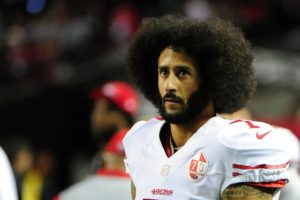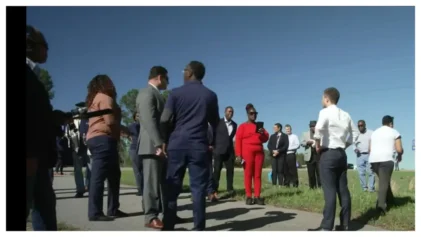
Colin Kaepernick won’t continue his protest of the national anthem this season if he is signed by an NFL team. (Scott Cunningham/Getty Images Sport)
“I thought I was from Milwaukee. I thought my ancestry started at slavery and I was taught in school that we were all supposed to be grateful just because we aren’t slaves. But what I was able to do was trace my ancestry and DNA lineage back to Ghana, Nigeria, the Ivory Coast, and saw my existence was more than just being a slave. It was as an African man. We had our own civilizations, and I want you to know how high the ceiling is for our people. I want you to know that our existence now is not normal. It’s oppressive. For me, identifying with Africa gave me a higher sense of who I was, knowing that we have a proud history and are all in this together.”
Colin Kaepernick’s heartfelt words came at the end of a recent daylong session of his Know Your Rights Camp held at the DuSable Museum of African-American History on Chicago’s South Side. The outspoken quarterback closed the event by presenting backpacks containing DNA kits to the over 200 Black and brown youths in attendance and encouraging them to trace their ancestry.
Though the controversial free agent is currently without an NFL home — a thinly veiled consequence of his high-profile 2016 protest of the national anthem — Kaepernick is by no means without a team. Over 50 Know Your Rights volunteers flew in from about the country to help organize the Chicago event, which included participation from celebrities and athletes like Common and San Francisco 49er Eric Reid. This is the third camp Kaepernick has convened for urban youths aimed at combating oppression through education and social activism, with previous stops in Oakland and New York City.
While upper management of the 32 teams of the National Football League have, thus far, not committed to signing the opinionated quarterback — and while some even question his commitment to continue playing football — few question his commitment to his current campaign and the young people it impacts. Kaepernick organizes, hosts and foots the bill for the free camps, which serve urban youths invited by local community organizations. Along with facilitated sessions on a range of topics including finances, holistic health, legal rights and history, the camp promotes a role-playing workshop on how to properly interact with law enforcement. The effort is just one component of Kaepernick’s recent pledge to “donate $1 million plus all the proceeds of my jersey sales from the 2016 season to organizations working in oppressed communities.” Others include his successful two-day effort in March to fly $1.8 million in aid to combat famine in Somalia and his personal distribution of custom-made suits to parolees in New York earlier this month.
Taking his lead from the Black Panther Party, Kaepernick developed a 10-point human rights platform as the centerpiece for the Know Your Rights camp:
- YOU HAVE THE RIGHT TO BE FREE.
- YOU HAVE THE RIGHT TO BE HEALTHY.
- YOU HAVE THE RIGHT TO BE BRILLIANT.
- YOU HAVE THE RIGHT TO BE SAFE.
- YOU HAVE THE RIGHT TO BE LOVED.
- YOU HAVE THE RIGHT TO BE COURAGEOUS.
- YOU HAVE THE RIGHT TO BE ALIVE.
- YOU HAVE THE RIGHT TO BE TRUSTED.
- YOU HAVE THE RIGHT TO BE EDUCATED.
- YOU HAVE THE RIGHT TO KNOW YOUR RIGHTS.
The Chicago event included free breakfast, a staple of the Black Panther Party programs, and a workshop on legal rights by attorneys Guillermo Gutierrez and Charles Jones from First Defense Legal Aid in Chicago. The lawyers, whose organization provides free, 24-hour legal representation to people in Chicago Police Department custody, stressed how the lives of the young attendees could very much depend on their navigation of future interactions with law enforcement. Characterizing Chicago as the “false-confession capital of the world,” the two offered a lesson on what to do when stopped by police, including a citizen’s right to ask, “Am I free to go?” and, if not, the right to say, “I do not consent to be searched.” Outside of that, the attorneys stipulated to “always remain silent” until you “have an attorney present.”
With such legal input, volunteerism and celebrity participation, when it comes to pushing for social justice, Kaepernick clearly has a committed team around him. But, given the talented 29-year-old still wants to play football and trains hard five days a week, it’s disappointing that his outspokenness has scared away NFL team owners from giving him another opportunity to play. Though reports recently surfaced that three teams had “reached out” to him, his girlfriend, MTV personality Nessa Diab, took to Twitter to squash these accounts, asking, “What supposed ‘three’ teams?” Diab’s response is indicative of a common belief NFL teams are either refusing to or fearful of signing Kaepernick despite a solid performance and stats last year on a bad 49ers team.
After replacing starter Blaine Gabbert in October, Kaepernick threw 16 touchdowns and four interceptions for his highest passer rating (90.7) since 2013, and ranked second among quarterbacks in rushing yards (468). To date, numerous quarterbacks with far less talent, including Gabbert, have found an NFL home for the 2017 season.
In March, prior to the start of free agency, Kaepernick decided he would stand for the anthem going forward, noting he’d increased the discussion around issues of social justice and wanted to minimize distractions for any future team. His gesture has yet to make a difference with NFL owners.
Still, one gets the feeling that, no matter what happens, the man at the center of a national debate for the better part of a year well recognizes that being different is a valued component of his own identity.
“Learning what it meant to be an African man in America — not a Black man but an African man — was critical for me,” Kaepernick said at the Chicago event.
“Through this knowledge, I was able to identify myself and my community differently.”


